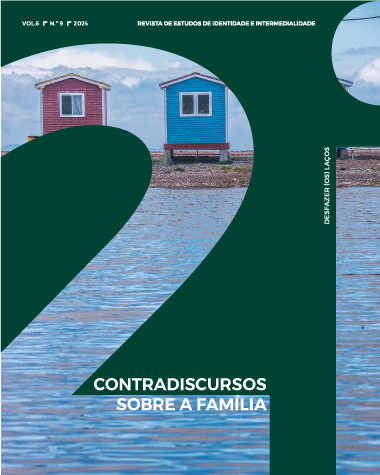To assault the hidden abode of reproduction
Critiques to the family from afrofeminism and the gay liberation fronts
DOI:
https://doi.org/10.21814/2i.5615Keywords:
family, marxism, periodasition, Black feminism, gay liberation frontsAbstract
The following article is intended to offer a historical account of the institution of the family in order to situate the abolitionist proposals and the Black feminist and queer critiques emerging during the second half of the twentieth century. The first section presents value-form readings of social reproduction, specially focusing on the 2013 article written by Maya González and Jeanne Neton, “The Logic of Gender”, to conceptualize the family as a “unit of privatised care”. Throughout the second section, the text lays out a periodisation of the emergence and historical changes that the family undergoes through the reconfiguring of social reproduction in a broader sense to locate the political approaches of the classical workers’ movement and its constitutive exclusions. Finally, the text presents two situated critiques of the family elaborated from its margins.
Downloads
References
Arruzza, C. (2015). Las sin parte: matrimonios y divorcios entre feminismo y marxismo. Barcelona: Sylone Editorial.
Best, B. (2021). Wages for Housework Redux: Social Reproduction and the Utopian Dialectic of the Value-Form. Theory & Event, 24, 4, 896-921.
Bhattacharya, T. (2015). How To Not Skip Class: Social Reproduction of Labor and the Global Working Class. Viewpoint Magazine. Disponível em https://viewpointmag.com/2015/10/31/how-not-to-skip-class-social-reproduction-of-labor-and-the-global-working-class/.
Butler, J. (2002 [1993]). Cuerpos que importan. Sobre los límites materiales y discursivos del ‘sexo’. Barcelona: Paidós.
Carson, R. (2023). Non-Capitalist Domination, Rentierism, and the Politics of Class. Crisis & Critique, 10, 1, 46-66.
Chen, C. (2013). The Limit Point of Capitalist Equuality. Endnotes, 3, 202-223.
Dallacosta, M. e James, S. (1979). El poder de la mujer y la subversión de la comunidad. Madrid: Siglo XXI España.
Day, I. (2021). Afro-feminism before Afropessimism: Meditations on Gender and Ontology. In Moon-Kie, J. e Costa Vargas, J. (eds.), Antiblackness (pp. 74-98). Durham, NC: Duke University Press.
De’Ath, A. (2018). Gender and Social Reproduction. In Best, B., Bonefeld, W. e O’Kane, C. (eds.), The SAGE Handbook of Frankfurt School Critical Theory (pp. 1534-1550). Londres: SAGE Publications.
_____ (2022). Hidden Abodes and Inner Bonds: Literary Study and Marxist-Feminism. In Lye, C. e Nealon, C. (eds.), After Marx. Literature, Theory and Value in the Twenty-First Century, (pp. 225-239). Cambridge: Cambridge University Press.
Endnotes. (2013). The Holding Pattern. Endnotes, 3, 12-55.
_____ (2015). A History of Separation. Endnotes, 4. Disponível em https://libcom.org/article/history-separation-endnotes-4.
Federici, S. (1975). Wages Against Housework. Disponível em https://warwick.ac.uk/fac/arts/english/currentstudents/postgraduate/masters/modules/femlit/04-federici.pdf.
Ferguson, S. (2021). Mujeres y trabajo. Feminismo, trabajo y reproducción social. Barcelona: Sylone Editorial.
Floyd, K. (2023). La reificación del deseo. Hacia un marxismo queer. Madrid: Kaótica Libros.
Floyd, K. et al. (Eds.). (2022). Totality Inside Out. Rethinking Crisis and Conflict under Capital. Fordham, NY: Fordham University Press.
Foucault, M. (1978). Historia de la sexualidad 1: La voluntad de saber. Madrid: Siglo XXI España.
Fraser, N. (2015). Las contradicciones del capital y los cuidados. New Left Review, 100, 111-132.
Giménez, M. (2018). Marx, Women, and Capitalist Social Reproduction. Leiden: Brill.
González, M. e Neton, J. (2013). La lógica del género y la comunización. México: 2&3Dorm.
González, M. (2010). Notes on the New Housing Question. Endnotes, 2, 52-67.
_____ (2013, setembro 28). The Gendered Circuit: Reading The Arcane of Reproduction. Viewpoint Magazine. Disponível em https://viewpointmag.com/2013/09/28/the-gendered-circuit-reading-the-arcane-of-reproduction/.
Hall, S. et al. (2023). Gobernar la crisis. Los atracos, el Estado y “la ley y el “orden”. Madrid: Traficantes de Sueños.
Hartman, S. (2019). Wayward Lives, Beautiful Experiments. Londres: Serpent’s Tail.
Hybris, I. (2023). Mutantes y divinas. Elementos de crítica transgénero. Madrid: Kaótica Libros.
James, S. (1975). Sexo, raza y clase. Una perspectiva para vencer. Madrid: Traficantes de Sueños.
Jameson, F. (1988). History and Class Consciousness as an “Unfinished Project”. Rethinking Marxism, 1, 1, 49-72.
King, T. L. (2018). Black ‘Feminisms’ and Pessimism: Abolishing Moynihan’s Negro Family. Theory & Event, 21, 1, 68-87.
Kollontai, A. (1921). El comunismo y la familia. Disponível em https://www.marxists.org/espanol/kollontai/comfam.htm.
Kristeva, J. (2006 [1980]). Poderes de la perversión. México: Siglo XXI.
Lewis, S. (2023). Abolir la familia. Un manifiesto por los cuidados y la liberación. Madrid: Traficantes de Sueños.
Marx, K. (1867). El Capital, vol.1. Madrid: Siglo XXI España.
Marx, K. e Engels, F. (1848). El Manifiesto Comunista. Disponível em https://www.marxists.org/espanol/m-e/1840s/48-manif.htm.
Mau, S. (2023). Mute Compulsion. A Marxist Theory of the Economic Power of Capital. Londres: Verso Books.
Mieli, M. (1980). Elementos de crítica homosexual. Barcelona: Anagrama.
Moynihan, D. P. (1965). The Negro Family: The Case for National Action. United States Department of Labor.
Nicolas, J. (1976). La cuestión homosexual. Papeles Insumisos. Disponível em https://drive.google.com/file/d/1yiSX2WW_MhFcxqolo12pt_rm-zQrlpSN/view?usp=drivesdk.
O’Brien, M. E. (2020). To Abolish the Family. Endnotes, 5, 361-417.
_____ (2023). Family Abolition: Capitalism and the Communizing of Care. Londres: Pluto Press.
Travis, E. (2022). El pueblo unito é meglio travestito. In Hybris, I. (coord.), Las degeneradas trans acaban con la familia, 261-315. Madrid: Kaótica Libros.
Repo, J. (2015). The Biopolitics of Gender. Oxford: Oxford University Press.
Seccombe, W. (1986). Patriarchy Stabilized: The Construction of the Male-Breadwinner Wage Norm in Nieteenh-Century Britain, Social History, 11 (1), 53-76.
Sherman, Z. (2021). Infrastructures and the Ontological Question of Race, e-flux journal. Disponível em https://www.e-flux.com/architecture/coloniality-infrastructure/411239/infrastructures-and-the-ontological-question-of-race/#:~:text=Race%20mediates%20the%20circulation%20and,Race%20is%20an%20infrastructure.
Spillers, H. J. (1987). Mama’s Baby, Papa’s Maybe: An American Grammar Book. Diacritics, 17, 2, 64-81.
Vishmidt, M. (2012). Counter (Re-)Productive Labour. Auto Italia South East Blog. Disponível em https://autoitaliasoutheast.org/blog/counter-re-productive-labour/.
Vishmidt, M. e Sutherland, Z. (2020). Social Reproduction: New Questions for the Gender, Affect and the Substance of Value. In Cooke, J. (ed.), The New Feminist Literary Studies (pp. 143-154. Cambridge. Cambridge University Press.
_____ (2022). (Un)making Value: Reading Social Reproduction through the Question of Totality. In Floyd, K., Hedler Philis, J. e Chandra, S. (eds.), Totality Inside Out, 67-90. Fordham, NY: Fordham University Press.
Vogel, L. (2013). Marxism and the Oppression of Women: Toward a Unitary Theory. Leiden: Brill.
Wilson Gilmore, R. (2007). Golden Gulag: Prisons, Surplus, Crisis, and Opposition in Globalized California. California: University of California Press.
Weeks, K. (1998). Constituting Feminist Subjects. Londres: Verso Books.
Zetkin, C. (1896). Only in Conjunction with the Proletarian Woman Will Socialism Be Victorious. Disponível em https://www.marxists.org/archive/zetkin/1896/10/women.htm.
Downloads
Published
How to Cite
Issue
Section
License
Copyright (c) 2024 Bruno Monfort

This work is licensed under a Creative Commons Attribution-NonCommercial 4.0 International License.


.jpg)










